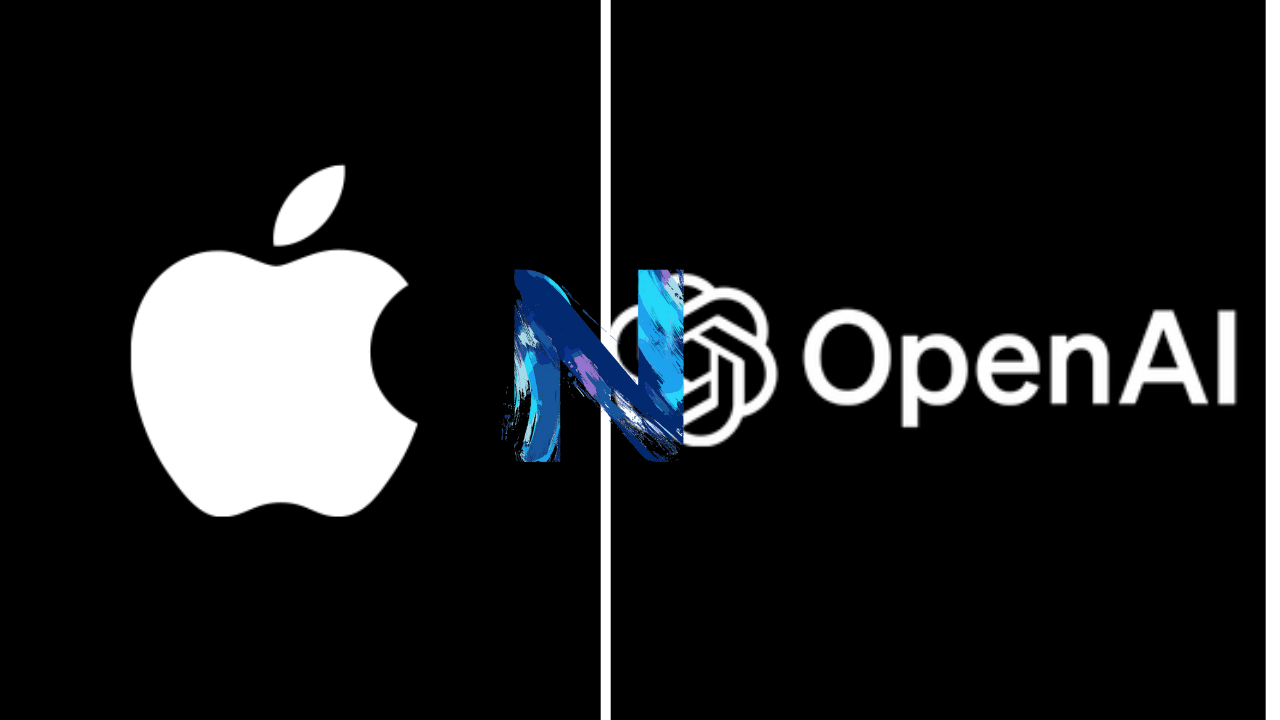Introduction
In a groundbreaking move that has the tech world buzzing, Apple has announced a strategic partnership with OpenAI. This collaboration promises to be a game-changer, leveraging the strengths of both giants to push the boundaries of technology and innovation. As Apple continues to dominate the hardware landscape with its cutting-edge devices, OpenAI’s prowess in artificial intelligence and machine learning will inject a new level of sophistication into Apple’s ecosystem.
This blog post will delve into the implications of this alliance, exploring how it might reshape the future of AI integration in consumer technology. From enhanced user experiences to the potential for groundbreaking new products, the Apple-OpenAI partnership is poised to redefine what’s possible in the tech world. Join us as we unpack the details of this exciting collaboration and its potential to revolutionize the industry.
Table of Contents
Enhancing Apple’s AI Capabilities
The Apple OpenAI partnership is set to significantly enhance Apple’s AI capabilities, marking a new chapter in the integration of artificial intelligence within consumer technology. Apple has consistently been at the forefront of embedding AI into its products, from the intuitive voice assistant Siri to the advanced computational photography systems in the latest iPhones. With this collaboration, Apple can leverage state-of-the-art AI research and development to not only improve these existing features but also to introduce groundbreaking new ones.

OpenAI’s expertise in natural language processing (NLP), computer vision, and generative AI perfectly complements Apple’s focus on creating intuitive and powerful user experiences. For example, Siri, Apple’s virtual assistant, stands to become far more sophisticated, capable of understanding and responding to complex commands with greater accuracy and context awareness. This could lead to a more natural and efficient interaction between users and their devices, making everyday tasks simpler and more enjoyable.
Additionally, this partnership can enhance Apple’s security features. OpenAI’s advanced machine learning algorithms can help Apple develop more robust security measures that proactively identify and mitigate threats. This is particularly important in an era where data privacy and security are paramount concerns for consumers. By integrating cutting-edge AI into its security framework, Apple can ensure that its devices remain among the safest in the market.
The collaboration also promises smarter applications that learn and adapt to user behavior in unprecedented ways. Imagine apps that can anticipate your needs, suggest actions based on your habits, and provide personalized recommendations with a level of precision that was previously unattainable. This level of personalization can significantly enhance the user experience, making Apple devices even more indispensable in daily life.
Furthermore, the partnership can drive innovation in areas such as augmented reality (AR) and virtual reality (VR). Apple has already made strides in these fields, but with OpenAI’s AI capabilities, the potential for creating highly immersive and interactive AR and VR experiences is immense. These advancements could revolutionize not just gaming and entertainment, but also education, healthcare, and professional training.
In conclusion, this partnership holds immense potential for enhancing Apple’s AI capabilities. By combining their strengths, they can create smarter, more secure, and highly personalized user experiences. This collaboration will likely set a new standard in AI integration within consumer technology, solidifying Apple’s position as a leader in innovation and user-centric design.
Innovating User Experience
One of the most exciting prospects of this partnership is the potential for groundbreaking innovations in user experience. This collaboration stands to redefine how users interact with their devices, bringing unprecedented levels of convenience, personalization, and intelligence to Apple’s product ecosystem. Here are several ways this partnership could innovate user experiences:

Advanced Virtual Assistants
Apple’s virtual assistant, Siri, is already a staple feature on iPhones, iPads, and Macs. However, with OpenAI’s advanced natural language processing capabilities, Siri can become significantly more intuitive and responsive. The partnership can lead to a Siri that not only understands complex commands but also engages in more natural, human-like conversations. This enhanced Siri could predict user needs, offer more accurate suggestions, and perform tasks with minimal input, making interactions with Apple devices smoother and more efficient.
Personalized User Experiences
Personalization is key to a seamless user experience, and this collaboration can take this to new heights. By leveraging OpenAI’s machine learning algorithms, Apple devices can learn from user behavior and preferences to offer highly tailored experiences. For instance, your iPhone could automatically adjust settings, suggest apps, or curate content based on your usage patterns and interests. This level of personalization can make devices feel like an extension of the user, providing a more intuitive and enjoyable interaction.
Smarter and More Context-Aware Applications
Applications across Apple’s ecosystem, from productivity tools to entertainment apps, stand to benefit from OpenAI’s capabilities. Imagine a calendar app that not only schedules appointments but also suggests optimal meeting times based on your habits and integrates travel time based on real-time traffic conditions. Or a music app that creates dynamic playlists tailored to your current mood and activities, thanks to AI-powered mood detection and analysis. These smarter, context-aware applications can significantly enhance productivity and enjoyment, making everyday tasks more manageable and enjoyable.
Augmented Reality (AR) and Virtual Reality (VR)
Apple has already made strides in AR with technologies like ARKit. However, the integration of OpenAI’s AI capabilities could elevate AR and VR experiences to new levels. For instance, AR applications could become more interactive and realistic, providing users with immersive experiences that adapt to their environment in real time. This could revolutionize fields such as gaming, education, and professional training, offering more engaging and effective ways to learn and interact with digital content.
Improved Accessibility Features
Accessibility has always been a priority for Apple, and the partnership with OpenAI can lead to the development of even more advanced accessibility features. AI can help create tools that better assist users with disabilities, such as more accurate voice recognition for those with speech impairments or improved visual aids for the visually impaired. This could make Apple devices more inclusive, ensuring that technology is accessible to everyone, regardless of their abilities.
Seamless Integration Across Devices
The synergy between Apple and OpenAI can also enhance the seamless integration of services across Apple’s ecosystem. OpenAI’s machine learning models can help create a more cohesive experience across all Apple devices. For example, tasks started on one device can be effortlessly continued on another, with AI predicting user needs and facilitating smooth transitions. This kind of integration ensures that users can enjoy a consistent and unified experience, regardless of the device they are using.
Enhanced Security and Privacy
User experience is not just about convenience and personalization; it’s also about security and privacy. Apple’s commitment to user privacy is well-known, and with OpenAI’s advanced AI capabilities, security features can become even more robust. AI can help detect and prevent potential security threats in real-time, ensuring that user data remains protected. Additionally, AI-driven privacy features can help manage data access and permissions more effectively, giving users greater control over their personal information.
Conclusion
The partnership holds immense potential for innovating user experiences. From more advanced virtual assistants and personalized interactions to smarter applications, enhanced AR/VR, improved accessibility, seamless device integration, and heightened security, this collaboration is set to redefine how users interact with technology. By combining Apple’s hardware prowess with OpenAI’s AI capabilities, the partnership promises to deliver smarter, more intuitive, and more secure user experiences, setting a new standard in the tech industry.
Implications for the Tech Industry
The Apple OpenAI partnership has far-reaching implications for the tech industry, marking a significant shift in how artificial intelligence is integrated into consumer technology. This collaboration between two of the most influential entities in technology is poised to drive innovation, set new industry standards, and foster a competitive yet collaborative environment. Here’s an in-depth look at the potential impacts:

Setting New Standards for AI Integration
This collaboration will likely set new benchmarks for AI integration in consumer technology. By incorporating cutting-edge AI capabilities into its devices and services, Apple is expected to enhance functionality and user experience significantly. This move will raise the bar for competitors, compelling them to accelerate their AI development efforts to keep pace. The result will be a wave of innovation across the industry, benefiting consumers with more advanced and capable technology.
Driving Ethical AI Development
Both Apple and OpenAI have strong commitments to ethical AI development. OpenAI’s mission is to ensure that artificial general intelligence (AGI) benefits all of humanity, while Apple prioritizes user privacy and data security. This partnership could lead to the establishment of new ethical guidelines and best practices for AI development and deployment. As industry leaders, Apple and OpenAI can influence other tech companies to adopt similar ethical standards, promoting responsible AI usage that respects user privacy and ensures fairness and transparency.
Fostering Innovation and Collaboration
The Apple OpenAI partnership exemplifies the power of collaboration in driving technological progress. This alliance can inspire other tech companies to seek similar partnerships, pooling resources and expertise to tackle complex challenges. Such collaborations can accelerate innovation, leading to breakthroughs that might not be achievable by a single entity. This collaborative spirit can foster a more dynamic and interconnected tech ecosystem, where shared goals drive collective advancements.
Enhancing Competitive Dynamics
The partnership will undoubtedly heighten competition within the tech industry. As Apple integrates OpenAI’s advanced AI into its products, competitors will be motivated to enhance their offerings to remain relevant. This increased competition can lead to a rapid pace of technological advancements and a wider array of innovative products for consumers. Companies will strive to differentiate themselves through unique features and superior user experiences, benefiting the end-users with better technology and services.
Influencing Market Trends
The influence of the partnership extends beyond their immediate product offerings. This partnership is likely to shape market trends and consumer expectations. For instance, as Apple introduces more sophisticated AI-driven features, consumers will begin to expect similar capabilities in other devices and services. This shift in consumer expectations will drive the entire industry to prioritize AI innovation and integration, transforming how products are developed and marketed.
Impact on AI Research and Development
The partnership between Apple and OpenAI can also have a significant impact on AI research and development. OpenAI’s research initiatives, combined with Apple’s resources and market reach, can lead to accelerated advancements in AI technologies. This collaboration can result in practical applications of cutting-edge AI research, bringing theoretical advancements to real-world use cases more quickly. The partnership could also attract top talent in AI, further driving innovation and pushing the boundaries of what AI can achieve.
Boosting Economic Growth
The advancements spurred by the partnership can have broader economic implications. As new technologies and products emerge, they can create new markets and opportunities for businesses and entrepreneurs. This can lead to job creation in sectors such as AI research, software development, hardware manufacturing, and more. Additionally, as AI becomes more integrated into various industries, it can drive productivity gains and efficiency improvements, contributing to overall economic growth.
Shaping Regulatory and Policy Frameworks
As leaders in the tech industry, Apple and OpenAI’s approaches to AI development and deployment can influence regulatory and policy frameworks. Their commitment to ethical AI and user privacy can set a precedent that shapes future regulations. Policymakers may look to the standards and practices established by this partnership when crafting regulations to ensure that AI technologies are developed and used responsibly. This can lead to a more balanced regulatory environment that promotes innovation while safeguarding public interests.
Conclusion
This partnership is a landmark development with profound implications for the tech industry. By setting new standards for AI integration, driving ethical development, fostering innovation and collaboration, enhancing competitive dynamics, influencing market trends, impacting AI research and development, boosting economic growth, and shaping regulatory frameworks, this collaboration is poised to drive significant advancements and transformations across the technology landscape. As this partnership leads the way, the entire industry stands to benefit, ultimately delivering more advanced, ethical, and user-centric technologies to consumers worldwide.
Outro
The Apple OpenAI partnership is a landmark development with profound implications for the tech industry. By setting new standards for AI integration, driving ethical development, fostering innovation and collaboration, enhancing competitive dynamics, influencing market trends, impacting AI research and development, boosting economic growth, and shaping regulatory frameworks, this collaboration is poised to drive significant advancements and transformations across the technology landscape.

As Apple and OpenAI lead the way, the entire industry stands to benefit, ultimately delivering more advanced, ethical, and user-centric technologies to consumers worldwide. This partnership marks the beginning of a new era, where the synergy between hardware and AI will unlock unprecedented possibilities, reshaping the future of technology and enriching our everyday lives.
As we watch this partnership unfold, it’s clear that the collaboration between Apple and OpenAI will not only push the boundaries of what technology can achieve but also inspire and influence the broader tech community to strive for greater innovation, responsibility, and excellence. The future is bright with promise, and we are on the cusp of witnessing remarkable transformations that will redefine our interaction with technology. Stay tuned for more updates as this exciting journey progresses.
For more blog posts click here.
Make sure to follow us on instagram and X.
The images used in this blog post were made using Midjourney.





